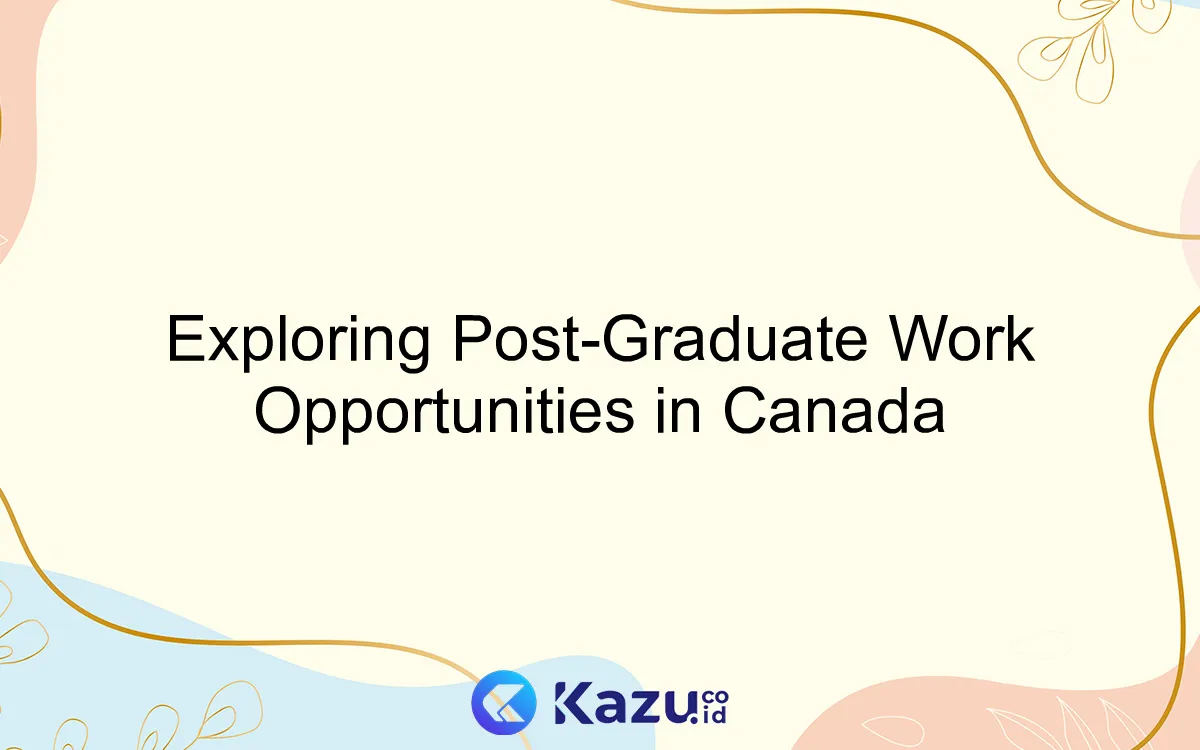Are you a recent graduate or about to complete your studies? Are you considering exploring post-graduate work opportunities in Canada? Look no further! In this article, we will delve into the various work opportunities available to international students in Canada and provide you with invaluable insights and tips to kickstart your professional career in the Great White North.
Understanding the Post-Graduate Work Permit Program
Canada offers excellent post-graduate work opportunities through its Post-Graduate Work Permit (PGWP) program. This program allows international students who have completed their studies at a designated learning institution in Canada to gain valuable work experience.
The PGWP is an open work permit, which means graduates can work for any employer in Canada without needing a job offer. The duration of the work permit depends on the length of the study program completed. Typically, it may be valid for up to three years.
One of the significant advantages of the PGWP program is that it allows graduates to gain Canadian work experience, which can be valuable for future career prospects. Several Canadian employers prioritize candidates with Canadian work experience, and the PGWP provides an opportunity to start building a professional network in Canada.
To be eligible for the PGWP, international students must have completed a full-time program that lasted at least eight months. The program must be from an eligible post-secondary institution, which includes universities, colleges, and other designated learning institutions. It is crucial to ensure that the chosen institution is eligible before enrolling.
It’s important to note that not all study programs in Canada qualify for the PGWP. Short-term programs, such as language training courses, are typically excluded. Therefore, it’s essential to plan the educational path carefully to maximize the benefits of the PGWP program.
International students who intend to explore post-graduate work opportunities in Canada should consider obtaining a PGWP. It allows them to gain valuable work experience, expand their professional network, and potentially open doors to permanent residency in the future.
Finding Job Opportunities Aligned with Your Field of Study

When exploring post-graduate work opportunities in Canada, it is crucial to seek out job positions that align with your field of study. Doing so not only increases the chances of finding a fulfilling career but also allows you to apply the knowledge and skills acquired during your education. Here are some tips to help you in your search:
-
Research and Networking:
Begin by researching industries and companies in Canada that are known for hiring graduates in your field. Join professional networks, attend job fairs, and connect with alumni to expand your opportunities.
-
Utilize Online Job Portals:
Websites like LinkedIn, Indeed, and Glassdoor offer a wide range of job postings categorized by industry and location. Customize your search criteria to match your field of study to find the most relevant results.
-
Consider Internships and Co-op Programs:
Participating in internships or co-op programs can provide valuable work experience while allowing you to establish connections in your industry. These opportunities often lead to full-time employment.
-
Engage with Career Services:
Take advantage of the resources provided by your educational institution’s career services department. They can offer guidance, industry insights, and access to job postings specifically targeted to recent graduates.
-
Showcase Relevant Skills and Experiences:
Tailor your resume and cover letter to highlight the skills and experiences gained through your studies that are directly applicable to the positions you are applying for. Emphasize any projects, research, or coursework that demonstrate your expertise.
-
Stay Persistent and Motivated:
The job search process can be challenging, so it is important to stay positive and persistent. Keep refining your application materials, reaching out to contacts, and attending networking events to increase your chances of finding the right job opportunity.
By actively searching for job opportunities aligned with your field of study, you can enhance your chances of securing a rewarding career post-graduation. Remember to continuously build your network, stay updated on industry trends, and remain resilient throughout the process.
Networking strategies for securing employment in Canada
When exploring post-graduate work opportunities in Canada, it is crucial to employ effective networking strategies to boost your chances of finding employment. Networking can significantly enhance your professional connections, increase your visibility in the job market, and open doors to hidden job opportunities that may not be advertised. Here are some key strategies to consider:
-
Attend career fairs and networking events
Take advantage of career fairs and networking events in your area. These events bring together employers, industry professionals, and potential job seekers. Prepare your elevator pitch, bring multiple copies of your resume, and actively engage with employers and fellow attendees.
-
Tap into alumni networks
Joining alumni associations or connecting with alumni from your educational institution can provide valuable contacts in your desired industry. Attend alumni events and reach out to alumni through professional networking platforms like LinkedIn.
-
Utilize online professional networks
Build a strong online presence by creating a professional profile on platforms such as LinkedIn. Connect with professionals and industry groups relevant to your field of interest. Engage in discussions, share insights, and showcase your skills and experiences to attract potential employers.
-
Engage in informational interviews
Informational interviews are valuable opportunities to learn more about specific industries and companies while expanding your network. Reach out to professionals in your desired field and request informational interviews to gain insights, advice, and potential job referrals.
-
Join professional associations and organizations
Become a member of professional associations and organizations related to your field. Attend meetings, workshops, and conferences organized by these groups to meet industry professionals, learn about job openings, and stay updated on industry trends.
-
Volunteer and participate in community events
Engaging in volunteer work and participating in community events not only allows you to give back but also presents opportunities to meet professionals from various backgrounds. This can expand your network and potentially lead to job opportunities.
By implementing these networking strategies, you can enhance your chances of securing employment in Canada after completing your studies. Remember, building meaningful connections and maintaining professional relationships are key factors in a successful job search.
Immigration pathways for international graduates
International students who have completed their post-graduate studies in Canada have several immigration pathways that they can explore to establish themselves in the country. These pathways provide opportunities for international graduates to stay and work in Canada, eventually leading to permanent residency.
1. Post-Graduation Work Permit (PGWP): International graduates who have completed a program of study at a designated learning institution in Canada are eligible to apply for a PGWP. This work permit allows them to work in Canada for up to three years, gaining valuable Canadian work experience.
2. Provincial Nominee Programs (PNPs): Many Canadian provinces have specific immigration programs designed to attract international graduates. These programs enable graduates to apply for provincial nomination, which can significantly increase their chances of obtaining permanent residency.
3. Express Entry: The Express Entry system is a federal immigration program that manages applications for three economic immigration streams: the Federal Skilled Worker Program, the Federal Skilled Trades Program, and the Canadian Experience Class. International graduates with Canadian work experience may be eligible to enter the Express Entry pool and receive an invitation to apply for permanent residency.
4. Canadian Experience Class (CEC): This immigration stream is specifically for individuals with Canadian work experience. International graduates who have obtained at least one year of skilled work experience in Canada can apply for permanent residency through the CEC.
It is important for international graduates to familiarize themselves with the requirements and eligibility criteria of each immigration pathway to determine the most suitable option for their situation. Consulting with an immigration lawyer or specialist can also provide valuable guidance throughout the application process.
Conclusion
Exploring post-graduate work opportunities in Canada opens up a world of possibilities for international students. With a thriving and diverse job market, supportive immigration policies, and access to quality education, Canada offers a promising future for those seeking professional growth. Whether through the post-graduate work permit program or pursuing permanent residency, graduates have ample opportunities to gain valuable work experience and contribute to the Canadian economy.
